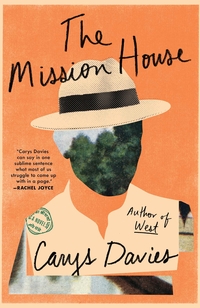
Published by Scribner on February 16, 2021
“Why is it a condition of life that we are made to love things if we are only to lose them?” Hilary Byrd asks himself sad questions throughout The Mission House. Whether he will find satisfactory answers to any of life’s riddles is the question that drives the reader’s interest in Byrd’s unremarkable life.
The reader is not told much about Hilary Byrd, but we know that his life was touched by tragedy during the Troubles. His sister Wyn may be his last friend, but even that relationship is strained. Byrd is in his early 50s. He spent half his life as a librarian in the UK. Byrd particularly enjoyed the library’s alcove of dictionaries in multiple languages and was disheartened when they were replaced by computers. He was fond of discovering words that had fallen out of use and felt saddened by their demise. His favorite forgotten word of the Norn language is dagw’’ilj’’ (pronounced dag-wall-gee), a word that means “to work continuously with poor result.” The unwanted dictionaries and forgotten words (particularly dagw’’ilj’’) might be symbolic of Byrd’s life.
Now Byrd is traveling and has made his way to India, a country that is much too hot for him. Taking a train to the mountains, where the heat is reputed to be less oppressive, he meets a kind Padre who offers him a good rate on a bungalow near the Padre’s church. The cottage was last occupied by a Canadian missionary named Henry Page.
Byrd is happy with the simple life that the cottage offers. He engages a fellow named Jamshed to drive him to the village each day in an auto rickshaw. Byrd uses these excursions to purchase food and browse books in the village library, where he learns how British rule has affected the town and the Toda people who are indigenous to the mountain region. Byrd occasionally converses with Jamshed but usually ignores him. Jamshed keeps a journal of his interactions with Byrd and fantasizes about having an enduring friendship with the man.
Jamshed’s nephew is Ravi, who works as the town barber and dreams of becoming a country-western singer. He has acquired a Stetson hat and a horse named Stephen. Ravi might also be hoping to acquire Priscilla, the young woman who lives in the presbytery with the Padre, who hopes to one day find her a suitable husband, suitable meaning “a good Christian man.” Priscilla has a short right leg and no thumbs, disabilities that, in the Padre’s view, might make her unmarriageable.
The foolishness of aging men is a central theme of The Mission House. At first with fear and then with hope, Byrd wonders whether the Padre might be thinking of him as a suitable husband for Priscilla. As he warms to the idea, he searches his conversations with the Padre for clues and gives them an optimistic spin but is invariably disappointed when the Padre mentions other potential suitors. He fears being judged a fool if he expresses any interest in Priscilla, even as he considers purchasing an engagement ring. “As long as he held it all inside himself, his feelings and everything he is doing, it seemed to him as if anything was possible.” Priscilla thinks of Byrd as a kindly uncle because he is helping her learn to sew and make scones and read English. Whether she will return Byrd’s affection seems unlikely, but who knows what might happen?
Byrd’s longing for Priscilla builds the foundation for the novel’s gentle humor. Byrd begins to dress in Henry Page’s clothes in the hope that they will make him look younger. He begins to attend church (despite having renounced Christian faith) because the Padre thinks Priscilla should have a Christian husband. (Nobody has consulted Priscilla, who views religion with a jaundiced eye.) Jamshed’s fascination with Byrd and Ravi’s pursuit of a country music career add to the story’s comic appeal.
Despite its humor, The Mission House is ultimately an exploration of lonely people who are discouraged by life. In both the Bible and the fairy tales that Priscilla is learning to read, she sees “considerable suffering and occasional joy and people doing all kinds of ugly things to each other,” an observation that sums up life as experienced by most of the novel’s characters. Like Byrd and Priscilla, Jamshed and Ravi and Henry Page are all vaguely disappointed with their lives. But The Mission House is also a novel of hope. Byrd comes to realize that his trip to the mountains in India has changed him for the better. The changes are small, but he had new experiences, learned new things, and even experienced a new love. Perhaps embracing small improvements in life rather than obsessing about unfulfilled desires is the key to living a good life.
Yet living a good life might mean putting aside one’s own desires and making sacrifices for the benefit of others. The novel’s unexpected ending is inspired by the rise of a Hindu nationalist party in India and, like nationalism everywhere, an intolerance of different religions and people who come from other places. The ending isn’t quite out of the blue — it is foreshadowed by Byrd’s reading and by chance remarks — but it changes the novel’s tone in a way that is almost shocking. There’s no need to be put off by that warning because the ending is left open, giving optimistic readers a chance to believe that good things might ultimately happen to people who prove their goodness in unexpected ways.
Still, the novel is more personal than political. The depth of its characterization and the unanswered questions it poses are as nourishing as Carys Davies’ meticulous prose. The juxtaposition of decent characters and the indecent world they inhabit makes The Mission House a layered novel that springs a new surprise with every chapter.
RECOMMENDED